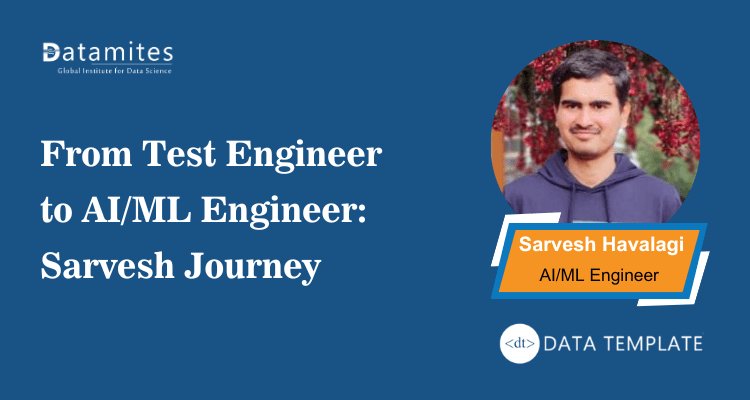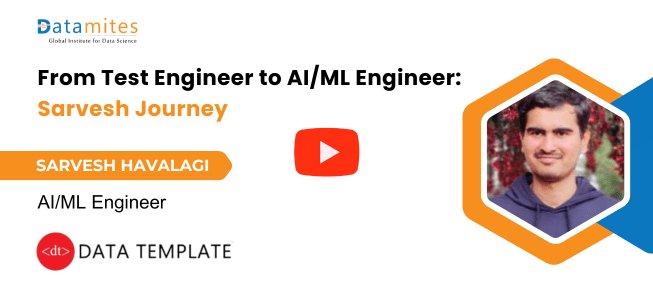Sarvesh’s Transformation from Software Tester to AI/ML Engineer
Sarvesh’s career journey is a compelling example of how dedication and the right training can lead to a successful transition into AI/ML—even from a non-IT background.

In a world where technology is evolving faster than ever, career transitions are no longer a rarity, they're a necessity. Meet Sarvesh, an aeronautical engineering graduate who once tested software but now builds intelligent systems. His transformation from a Software Test Engineer to a thriving AI/ML Engineer is a story of curiosity, persistence, and strategic learning. Whether you're from a non-IT background or stuck in a role that doesn’t ignite your passion, Sarvesh’s journey proves that with the right mindset and guidance, you can rewrite your career narrative one line of code at a time.
Q&A with Sarvesh: His Road to Becoming an AI/ML Engineer
In this Q&A, he shares how he overcame challenges and built a successful career in artificial intelligence.
Q1: Can you introduce yourself and share your background?
My name is Sarvesh, and I’m from the Vijayapura district, Karnataka. I completed my engineering in Aeronautical Engineering in 2019. After graduation, I spent a couple of years preparing for competitive exams. In December 2021, I started my corporate career as a Software Test Engineer. Later, I decided to transition into the AI/ML field and joined DataMites for training.
Q2: Why did you choose to switch from software testing to AI/ML engineering?
During my testing role, I realized that AI and Machine Learning concepts were far more interesting and impactful than my current work. The growing opportunities in AI fascinated me, and I wanted to build a career in this field. That’s when I chose DataMites to help me make this transition.
Q3: How was your learning experience at DataMites?
I joined the AI Expert course in April 2022. The training covered Python, statistics, machine learning, deep learning, NLP, deployment methods, and more. I found Python to be one of the easiest programming languages to learn. Even with my non-IT background, I could understand it within a month or two by dedicating a couple of hours daily.
Q4: Did you face challenges during the course, considering you were from a non-IT background?
Not really. Although I had no prior experience in statistics or machine learning, the trainers explained concepts clearly. My basic programming knowledge from test automation helped me grasp Python quickly. With consistent practice and assignments, I was able to catch up with the course easily.
Q5: How much time did you dedicate to learning daily?
Apart from the 2-hour daily training sessions, I spent an additional 2 hours for self-study during weekdays. On weekends, I focused on completing assignments and projects. On average, I invested around 3–4 hours a day for nearly 10 months to complete the course.
Q6: How did DataMites help you with practical learning and projects?
After completing the coursework, I gave a mock interview and then worked on four live projects in a team. These included:
- Regression Project: Tax salary prediction
- Classification Project: Skin disorder detection
- Clustering Project: FIFA 20 dataset analysis
- Image Classification Project: Rice leaf detection
Additionally, I worked on NLP and advanced NLP projects, experimenting with both existing and emerging models. These projects were crucial because many interview questions were based on real-world project experience.
Q7: What was your mock interview experience and job-ready score?
The passing score was 6, and I initially scored 5.5. Since I had challenges balancing office work and preparation, I struggled a bit. However, the DataMites team supported me and promoted me to continue with project work and interviews, which helped me improve over time.
Q8: How many interviews did you attend, and how did you prepare for them?
I started attending interviews in early 2023 and gave around 10 interviews. I cleared the theory rounds in most cases, but initially failed in programming and advanced Python tasks. For example, in one interview, I was asked to design a chatbot using RAG but couldn’t recall the required libraries. After each interview, I documented my mistakes, revisited Python documentation, and improved step by step. Eventually, I cleared the interviews and secured multiple job offers.
Q9: Were all interviews arranged by DataMites?
Out of the 10 interviews, 6 were arranged by the DataMites placement team, and the remaining I found through LinkedIn and job portals. I appreciate the DataMites placement support, which kept me actively engaged in opportunities until I landed my AI/ML Engineer role.
Q10: What kind of technical questions were commonly asked in your interviews?
- Machine Learning: Questions on different ML models, their applications, and hyperparameter tuning
- Statistics: Concepts like the empirical rule and basic statistical methods
- NLP: Advanced NLP concepts, transformers, word vectors, embeddings, attention networks, and vector databases
I noticed NLP-related questions were more frequent than statistics questions. Preparing for model training, deployment, and advanced NLP techniques helped me clear the later interviews.
Q11: Does academic background matter for a career in AI and Data Science?
Not at all. I’ve seen people from MSc and non-IT backgrounds successfully entering IT roles. The key is continuous upskilling and learning. With dedication and structured training like that at DataMites, anyone can make the switch.
Q12: How did you manage working full-time and preparing for projects?
I worked on projects early mornings, after office hours, on weekends, and even took leaves when necessary. If you’re serious about transitioning into AI, you must prioritize learning over your current job responsibilities—while still maintaining professionalism.
Q13: What advice would you give to aspiring AI professionals?
- Don’t let your background or language skills discourage you.
- Focus on projects, as interview questions are largely project-based.
- Keep learning from each failed interview and strengthen weaker areas.
- Stay updated with the latest open-source tools, GitHub projects, and AI models.
- With consistency and structured training, you can start as a Data Scientist and grow into advanced AI roles within a year.
Refer these below articles:
- From Math Graduate to Machine Learning Developer: Ankita’s Inspiring Journey into AI
- Reeta’s Inspiring Journey to Becoming a Data Annotator
- Innovation Through Intelligence: Rahul’s AI Career Unfolded
Key Findings from Sarvesh’s AI/ML Journey
Here are the most valuable insights from his journey that can guide aspiring data science professionals.
Background in Non-IT Field:
- Sarvesh is an Aeronautical Engineering graduate (2019) from Vijayapura, Karnataka.
- Entered the corporate world in 2021 as a Software Test Engineer.
Motivation to Switch to AI/ML:
- Found AI and ML concepts more engaging than testing.
- Choose to transition careers with structured training from DataMites.
Learning Experience at DataMites:
- Enrolled in the AI Expert course in April 2022.
- Gained skills in Python, statistics, machine learning, deep learning, NLP, and deployment techniques.
Ease of Learning Despite Non-IT Background:
- Had no prior experience in statistics or ML.
- Found Python easy to learn within 1–2 months through consistent study.
- Basic Java knowledge helped ease the transition to Python.
Time Management and Study Routine:
- Dedicated 2 hours daily for training + 2 hours for self-study.
- Spent 3–4 hours a day on average for 10 months.
Read these below articles:
- Is There Still a High Demand for Artificial Intelligence in Shillong?
- Is the Demand for Artificial Intelligence Still High in Rourkela?
- Is There a Growing Demand for Artificial Intelligence in Panaji?
Sarvesh’s journey with DataMites proves that with the right training and consistent effort, transitioning from a non-IT background to a career in AI/ML is entirely possible. His success serves as a motivating example for anyone aiming to build a future-ready career in Artificial Intelligence and Data Science. Notably, the global AI software market valued at US$122 billion in 2024 is projected to grow at a CAGR of 25%, reaching US$467 billion by 2030, underscoring the immense opportunities in this rapidly expanding field (ABI Research).
DataMites Artificial Intelligence Institute in Kolkata, designed to equip learners with essential skills and industry-relevant knowledge. Recognized by Analytics India Magazine as one of the top AI training providers in India alongside institutions like IIT and IIM, DataMites has earned a strong reputation in AI education.
The DataMites Artificial Intelligence Course in Kolkata provides a well-rounded learning experience, combining hands-on projects, expert mentorship, and robust placement support. Designed for both freshers and professionals looking to upskill, the course aligns perfectly with the city’s growing tech landscape. Upon completion, learners earn globally recognized certifications from IABAC and NASSCOM FutureSkills, enhancing their credibility and opening doors to promising career opportunities in the competitive AI job market.

